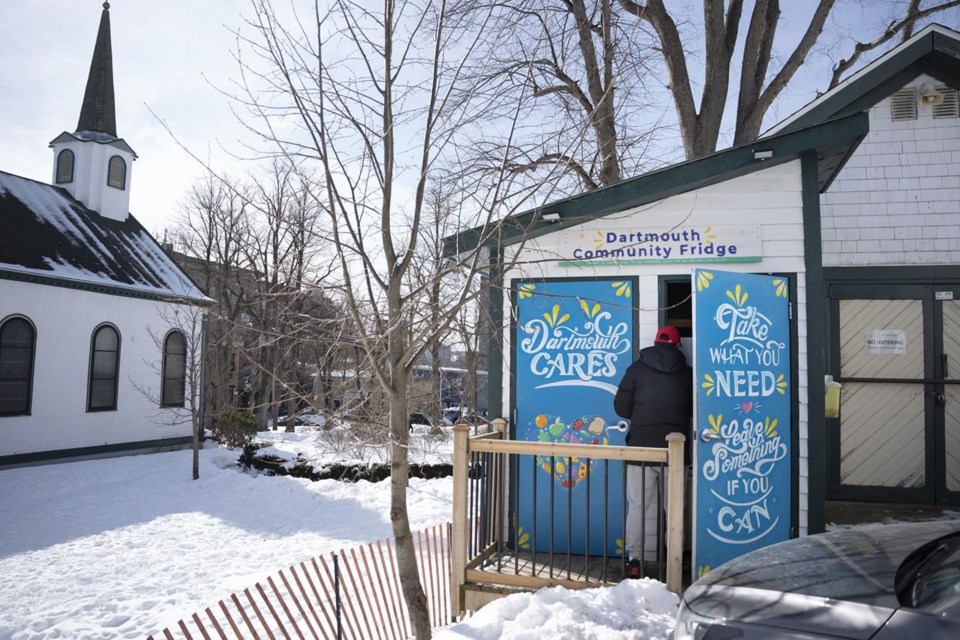HALIFAX — Outdoor fridges and pantries, often painted in bright, inviting colours, are popping up across Atlantic Canada, and the people regularly stocking them say demand is growing.
Community fridges or pantries, typically run by volunteers or community groups, are monitored storage spaces that offer free, fresh and non-perishable food. The model is to make food available at all hours of the day, with fewer barriers than traditional food banks.
As the cost of living, especially food, continues to rise, these projects highlight how neighbours are helping to keep each other from going hungry. But community organizers and experts in food insecurity say community fridges aren't substitutes for the social safety net that governments are responsible for maintaining.
Christene Nottegar, a volunteer at the Dartmouth Community Fridge — one of the largest such fridges in the Halifax area — said that while her group doesn’t track the use of the food storage space, demand seems to be growing.
“A conservative estimate would be that there are at least 10 people who access the fridge every hour during the daytime,” Nottegar said.
“We now see people lining up and waiting for food. Oftentimes people will come and wait because they know food will be coming, so they wait hours sometimes.”
The fridge, located next to a Dartmouth church, is painted bright blue with cheery yellow flowers and reads, “Take what you need, leave something if you can.”
First opened in May 2022, the project includes a fridge, freezer and pantry, and is linked to the Public Good Society of Dartmouth and Christ Church, which houses iton its property. In addition to accepting food donations from community members, the Dartmouth Community Fridge accepts monetary donations, and its volunteers shop for healthy, fresh food to keep it well stocked.
Peter Andrée, a Carleton University professor who studies sustainable food systems, said in an interview these projects are trying to address a problem that is "only going to get bigger."
He said climate change will lead to an increase in the price of food as more frequent fires, droughts, floods, and other natural disasters further challenge farmers.
“This is a structural problem that our governments, and we as a society, need to come to terms with — life is going to get more expensive. So we have to figure out how to better share.
“Not just through neighbourhood mutual aid and support, but also through government policy,” which Andrée said should include universal income or increased rates of social assistance to ensure people have the money they need to get by.
In Moncton, N.B., Heddy May said she wanted to do something to help her neighbours after seeing an uptick in posts in a Moncton-area Facebook group from families asking for donated food. May came across an initiative called Little Free Pantry, which offers online resources for how to successfully run a community pantry, and decided to install one on her front lawn.
For Christmas, May asked her family for a pantry she could stock and maintain in front of her house. “It was certainly the best gift I got this year,” she said with a laugh.
May’s father built her a wooden pantry with glass doors that is raised off the ground on three table legs. The cupboard holds donated food like peanut butter, tins of tuna, bread, baby formula and instant rice dinners. May said she tries to ensure the pantry also has basics like tampons, toilet paper and diapers.
She has help from her family, including her three children, to keep an eye on expiry dates and make sure the pantry and surrounding area are kept clean.
Chris Pellerin, interim manager of the Second Mile Food Bank in Moncton, said he’s seen a rise in community pantries and the number of people needing food.
Pellerin said that as demand for food spikes, community pantries “are bound to happen” as people try to help their neighbours get fed. He said Second Mile has sponsored a few local pantries, but he admits they could come with “complications.”
“You have to think about rodents, mice and squirrels, and the cold Canadian winter," Pellerin said in a recent interview. "Some stuff can’t be put outside, can’t be eaten if it freezes. So it’s really important that these things are well protected."
Andrée said it's important that individuals who launch mutual-aid projects like community pantries, fridges and other food centre programs also push for increased government support.
"It's about saying, 'We're going to do what we can, and we're going to advocate for government to do its part too,'" he said.
This report by The Canadian Press was first published Feb. 21, 2024.
Lyndsay Armstrong, The Canadian Press



